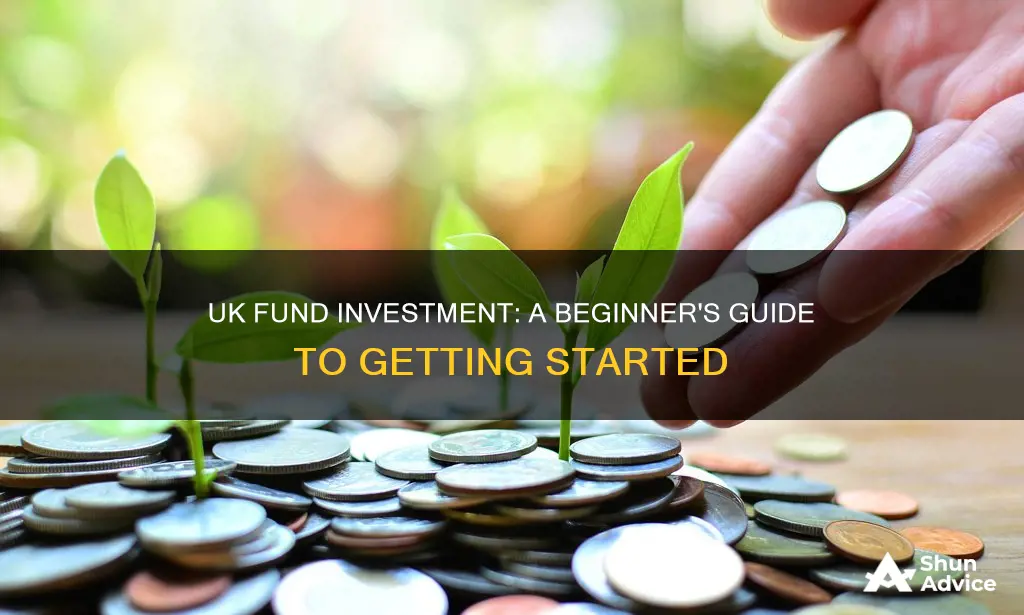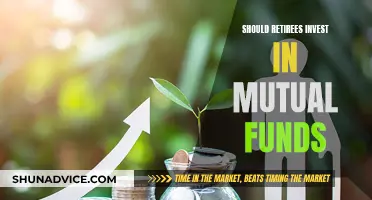
Investing in funds is a popular way to get started with investing. A fund is a collective investment where your money is pooled with other people's money, rather than choosing and buying individual shares. This means your investment will be spread across multiple stocks and shares, and your risk will be spread.
Funds usually contain a range of shares or other assets, often based on a specific theme, for example, European markets, green companies, or corporate bonds. The fund manager decides the exact choice of investments, which will either be actively managed or passive.
There are a few things to consider before investing in funds. Firstly, investing is generally a long-term option, and it's recommended to invest for at least five years to ride out any bumps in the market. Secondly, you'll need to factor in fees, such as platform charges, buying and selling charges, and management fees. Finally, it's important to remember that there are no guarantees when investing, and you could get back less than you invest.
| Characteristics | Values |
|---|---|
| Minimum Investment Amount | £50 |
| Minimum Monthly Investment | £25 |
| Investment Timeframe | 5 years or more |
| Investment Options | Stocks & Shares ISA, General Investment Account (GIA), SIPP, Active Savings Account, Junior SIPP, etc. |
| Investment Risk | Less risky than buying individual shares |
| Investment Diversification | Money is spread across multiple stocks and shares |
| Fund Management | Active or Passive |
| Fund Types | Index funds, Active funds, ETFs, etc. |
| Fund Pricing | Based on net asset value (NAV) of underlying holdings |
| Buying Funds | Online, Over the Telephone, By Post |
| Fund Platforms | iWeb, AJ Bell, Hargreaves Lansdown, Interactive Investor, Vanguard, etc. |
| Charges | Platform Charge, Buying/Selling Funds, Transfer-Out Fee, Fund Manager/Annual Management Charge |
What You'll Learn

Stocks and Shares ISA
- You can pay a total of £20,000 into ISAs each tax year (from 6 April to 5 April).
- You can divide your ISA allowance across the four different types of ISAs: cash, stocks and shares, innovative finance, or lifetime. However, the maximum you can put into a lifetime ISA is £4,000 each tax year.
- Any increase in the value of the investments in your Stocks and Shares ISA is free from Capital Gains Tax.
- Most income from your Stocks and Shares ISA is tax-free.
- You can sell the assets held in your ISA at any time, and there is no minimum length of time you need to hold it.
- Charges on Stocks and Shares ISAs vary, so it is important to check the fees before investing.
- You can buy Stocks and Shares ISAs from different providers, but the cheapest way to do it is through a website or platform.
- You can invest in a wide range of different products with a Stocks and Shares ISA, including exchange-traded funds, individual stocks and shares, corporate and government bonds, and OEICs (Open-Ended Investment Companies).
- A Stocks and Shares ISA may be a good option for you if you are not looking for immediate access to your money and are prepared to keep your money invested for several years.
Trust Fund Investment: Strategies for Long-Term Wealth
You may want to see also

Active vs passive funds
When investing in funds, your money is spread across a wide range of underlying investments, which are overseen by a fund manager. The fund manager's job is to run the fund in line with its stated investment objectives, meeting declared targets in order to deliver a profit for investors.
Funds are generally divided into two types: active and passive. Both types aim to make money from whatever assets they hold, be it shares, bonds, property or commodities.
Active Funds
Active fund managers pick and choose investments with the aim of delivering a performance that beats the fund's stated benchmark or index. They will frequently buy, hold and sell stocks to try to achieve this goal. The best active managers are those who can navigate market volatility year after year. However, there is never any guarantee that even the most talented fund manager will pick investments that will outperform on a regular basis.
The cost of active investing is higher, with investors paying annual charges for the expertise of the fund manager, usually anywhere between 0.6% to 1.5%, but sometimes more.
Passive Funds
Passive funds, also known as 'tracker' funds, have a different aim. They try to deliver a return that is in line with the market, rather than trying to outperform it. For example, a passive fund will buy shares in the 100 biggest companies in the UK (based on share value) and in the same proportions as their market value. The value of the fund will then move in line with the change in the value of the index.
Passive fund managers do not pick and choose investments, so your return depends entirely on the performance of the index being tracked. If the market falls, so will your fund. Passive funds typically carry lower fees than active funds, with some having an annual management charge of around 0.1%.
Active vs Passive
The debate between active and passive funds continues, with each offering pros and cons. Passive funds are often considered a better option for efficient or well-researched markets, while active funds are thought to perform better in less established and more volatile markets.
The choice between active and passive funds will depend entirely on your investment goals and risk tolerance.
Mutual Fund Investment: Getting Started and Where to Begin
You may want to see also

Tax-efficient funds
Stocks and shares ISAs are a popular choice for investors as they provide a tax-efficient way to invest in a wide range of funds. You can choose from thousands of funds, including index funds, active funds, and ETFs, to build your own portfolio or select a ready-made portfolio that matches your risk tolerance and financial goals.
When investing in a stocks and shares ISA, it's important to consider the fees and charges associated with the platform and the specific funds you choose. These fees can include platform charges, buying and selling charges, and fund management fees. It's also important to remember that the value of your investments can go up as well as down, so investing in a stocks and shares ISA may not be suitable for everyone.
In addition to stocks and shares ISAs, there are other tax-efficient funds available in the UK. For example, a Self-Invested Personal Pension (SIPP) allows you to invest for your retirement while receiving tax relief on your contributions. Junior ISAs and pensions are also tax-efficient ways to invest for your child's future.
Before investing in any tax-efficient fund, it's essential to consider your financial goals, risk tolerance, and the potential fees and charges. It's also recommended to seek financial advice to ensure that you are making the best decisions for your circumstances.
Endowment Funds: A Smart Investment for Your Future
You may want to see also

Investment platforms
There are several investment platforms available in the UK, each with its own features and fees. Here are some popular options:
- IWeb: iWeb has a one-off fixed opening charge and no annual platform charge. It offers over 2,000 funds, but there is a currency exchange fee of 1.5% for non-UK funds.
- AJ Bell: AJ Bell has a flat-rate fund-dealing charge and a percentage-based annual platform fee. It provides access to more than 2,000 funds, with a currency exchange fee of up to 1% for non-UK funds. You can start investing with as little as £25 per month.
- Hargreaves Lansdown: Hargreaves Lansdown does not charge for buying or selling funds, but there is a tiered percentage platform fee that increases with the amount you invest. It offers over 3,000 funds, with a currency exchange fee of up to 1% for non-UK funds. Regular investing is available from £25 per month.
- Interactive Investor: Interactive Investor offers a fixed monthly platform charge, with two free fund trades per month. It provides access to over 3,000 funds, but non-UK funds will incur an exchange fee of up to 1.5%.
- Vanguard: While not a traditional platform, Vanguard offers a low platform charge of 0.15% and tends to have funds with low annual management charges.
When choosing an investment platform, it's important to consider factors such as your level of experience, investment frequency, and the range of funds available. Additionally, be sure to review the fees and charges associated with each platform, as these can impact your overall returns.
DFA Funds: Smart Investment, Diversified Returns
You may want to see also

Long-term investment goals
Stocks and Shares
Stocks and shares are a well-known and popular option for long-term investments. This approach allows investors to buy and sell shares in individual companies, which can result in greater returns than a funds-based approach. However, investing in individual companies also carries more risk, as you are dependent on the performance of a single entity rather than a diversified portfolio. It's important to have a long-term horizon, typically at least five years, when investing in stocks and shares.
Funds
Funds are a type of collective investment where your money is pooled with that of other investors. The fund manager then invests the pooled money in a range of assets, such as shares, bonds, or other securities. This diversification can help to reduce risk, as your investment is spread across multiple assets. Funds can be actively managed, where the fund manager actively selects investments to try and outperform a benchmark, or passively managed, where the fund tracks a specific market index.
Bonds
Bonds are another option for long-term investments. When governments or companies need to borrow money, they issue bonds, which are essentially IOUs. Bonds typically provide regular income payments and are considered less risky than shares or funds. They are also referred to as fixed-interest securities, and the interest paid over the lifetime of the bond is known as the coupon or nominal yield.
Property
Investing in property is another long-term investment option. This could involve buying a physical property to rent out, or investing in a property fund that pools money from multiple investors to purchase properties. Property investments can provide regular income through rent and potential capital growth over time.
Pension Schemes
Investing in a pension scheme is a long-term investment strategy that can help you save for retirement. There are various types of pension schemes available, such as workplace pensions, personal pensions, and self-invested personal pensions (SIPPs). These schemes often benefit from tax relief, and the money is usually locked in until retirement, allowing for potential growth over time.
Remember to do your own research, understand the risks involved, and consider seeking independent financial advice before making any investment decisions.
Advisor Fund Investment: Long-Term Strategy for Success
You may want to see also
Frequently asked questions
Investing in funds means your money is spread across multiple assets, so your risk is spread. Fund managers also benefit from their expertise, knowledge and time spent researching and picking the best opportunities in a chosen sector.
You can choose a fund based on its specialisation in a particular sector. For example, if you're interested in Europe, you could invest in a fund that focuses on European markets. You can also choose between active funds, which aim to do better than a benchmark, and passive funds, which try to closely track the performance of a stated index.
You can buy funds online, over the telephone or by post. You'll need to read the fund's Key Investor Information Document (KIID) or Key Features first. You can then log in to your account and search for the fund you want to buy, choosing a quantity or value.







